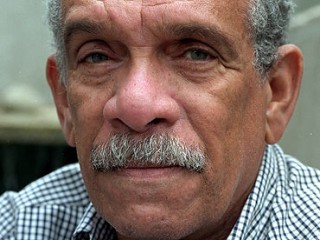
Derek Alton Walcott biography
Date of birth : 1930-01-23
Date of death : 2017-03-17
Birthplace : Casties, St. Lucia, West Indies
Nationality : Saint Lucian
Category : Famous Figures
Last modified : 2024-01-23
Credited as : Poet and dramatist, Nobel Prize in Literature, T. S. Eliot Prize 2011, Trinidad Theatre Workshop, Omeros
3 votes so far
Derek Walcott: The Nobel Prize Winner Who Wove Caribbean Rhythms into World Literature
In the sun-kissed town of Castries, St. Lucia, a literary luminary named Derek Alton Walcott was born on January 23, 1930. The son of a civil servant and a teacher, Walcott's mixed African, Dutch, and English heritage would become the rich tapestry from which his artistic brilliance would emerge.
An Island Odyssey to Literary Heights
Walcott's journey from the Caribbean to global acclaim began with a Rockefeller fellowship that brought him to the United States in 1957. Under the mentorship of American stage director Jose Quintero, he founded the Trinidad Theatre Workshop upon his return in 1959. Teaching across the Caribbean and various American universities, from Boston to Yale, Walcott became a cultural ambassador bridging the gap between the Caribbean and the European traditions.
Life, Love, and Literary Genius
Married to dancer Norline Metivier, Walcott's personal life mirrored the complexity of his heritage. With three children from previous marriages, he maintained connections to his roots while becoming a revered figure in Trinidad, a place he proudly called home. In 1981, he was honored with a five-year "genius" grant from the John D. and Catherine T. MacArthur Foundation.
The Dramatic Symphony of Caribbean Culture
Walcott's dramatic works, such as "Henri Christophe: A Chronicle" and "Dream on Monkey Mountain," vividly depict the vibrant island culture, infusing historical roots and political subtexts. Through defiance and translation, he navigated a delicate balance, grappling with powerful emotions without compromising literary virtuosity.
The Poetic Alchemy of Caribbean Rhythms
From his first poem at the age of 14 to the Nobel Prize-winning "Omeros," Walcott's poetry is a symphony of Caribbean rhythms interwoven with the echoes of Shakespeare, Marvell, Auden, Eliot, and Lowell. Through personas like Shabine, his poetic alter-ego, he explored the "divided child" within, torn between cosmopolitan influences and Caribbean roots.
A Versatile Tapestry of Verse
Walcott's poetic range was vast, from the sweeping narrative of "Another Life" to the meditative reflections in "Midsummer." "The Arkansas Testament" showcased a poignant exploration of racial and cultural exile, affirming his position as a literary giant.
Omeros: A Caribbean Epic
In 1990, Walcott's epic-length "Omeros," drawing parallels to the Iliad and the Odyssey, earned acclaim and a place among the best books of the year. This masterful work echoed themes of abandonment and wandering, revealing his deep love for the Caribbean and its sea-surrounded geography.
Nobel Laureate and Literary Legacy
In 1992, the pinnacle of recognition arrived as Derek Walcott was awarded the Nobel Prize in literature. His contributions to West Indian drama and poetry left an indelible mark, with works like "The Odyssey" gracing stages in New York and London. "The Bounty," a collection of poems in 1997, further celebrated the beauty of his native land.
The Sea, the Islands, and the Imprint of a Legacy
Derek Walcott's legacy endures in the sea, the islands, and the very geography that formed him. His love for the Caribbean, expressed through his poetic talents, immortalized the culture and beauty of his homeland. As he once remarked, "nobody wishes to escape the geography that forms you." Derek Alton Walcott, the literary maestro, remains an eternal presence in the heart of the Caribbean and the annals of world literature.
















